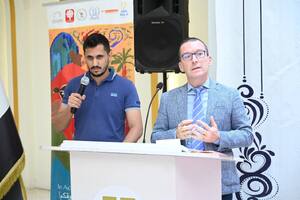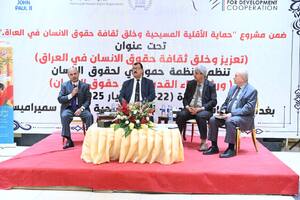
In a unique and qualitative step, the Hammurabi Human Rights Organization completed a forum consisting of workshops and various sessions to promote the culture of human rights within the project "Protecting the Christian Minority and Creating a Culture of Human Rights in Iraq," aimed at female faculty academics from four public universities in Iraq: Baghdad, Al-Mustansiriya, Al-Iraqiya, and Basra University.
The forum, which included eight sessions, was held in Baghdad over three days for the period May 22-24, 2025 in the Samiramis Hall of the Hindiyah Club, implemented by the Hammurabi Organization, in cooperation with the John Paul II Foundation, and funded by the Italian Development Agency ,aiming at twenty female lecturers with postgraduate degrees from the four aforementioned universities including eight sessions distributed over legal topics and themes that the Hammurabi Human Rights Organization is concerned with, particularly combating violence against them, the issue of protecting minorities and children, ensuring the rights of persons with disabilities, promoting religious freedoms, and ensuring Freedom of conscience and belief, relevant national laws and legislation, the Iraqi international obligations under relevant international instruments and agreements.
The workshops and sessions focused on the objectives for which the forum was held, namely raising awareness among female university lecturers of the rights and freedoms guaranteed by laws, declarations and treaties on human rights, particularly those included in the International Charter, as well as introducing the national constitutional and legal guarantees concerned with respect for human rights, which focused in particular on protecting religious and ethnic minorities and ways to preserve diversity in Iraq, raising
awareness of women’s rights, studying their reality, protecting them from violence in all its forms, especially women in minorities, and introducing their role and responsibilities and ways to support and involve them in the decision-making process.
The sessions also aimed to raise awareness of the rights of persons with disabilities and ways to care for, rehabilitate, integrate and prevent discrimination against them focusing on children’s rights protecting them from exploitation and participation in armed conflicts. The forum also allocated special sessions to promote religious freedom and respect for freedom of belief and conscience , focusing on the Personal Status Law, weaknesses and strengths, and ways to amend and address it, especially Article 26 regarding the Islamization of minor children from non-Muslim minorities. In addition, the forum allocated a special session to introducing the conditions of non-Muslim minorities in Iraq (Christians, Yazidis, Baptist-Mandeans, and others).
The sessions featured specialized Iraqi national figures and experts in the fields concerned with each topic. The using methodology, mutual dialogue, and interactive discussions between the lecturers and the participants allowing for questions and dialogue.
On the first day, the first session dealt with women’s rights and combating violence against them, was attended by Judge Hadi Aziz a specialist in civil law ,Dr. Pascale Warda, a specialist in advanced studies in human rights from the Catholic University of Lyon Chairwoman of the Hammurabi Human Rights Organization and Dr.Rafkah Khalil, a lecturer at the Faculty of Arts specialist in the philosophy of Christian history.
As for the second session was concerned with women’s rights in minorities where interventions were by Dr.Suhad Qasim, a lecturer at the University of Baghdad and a representative of the Baha’i faith in Iraq , Dr.Kholoud Hadi, a lecturer at the University of Baghdad and a researcher in Shabak rights in Iraq, and Dr.Pascale Warda, head of the Hammurabi Organization.
The third session dealt with the weaknesses and strengths of the effective Iraqi Personal Status Law, as well as the means of addressing them and opportunities for amendment. The session was attended by Professor Retired Judge Salem Al-Roudhan, Judge Ahmed Jasib Al-Saadi, Vice President of the Rusafa Court, and Dr.Ali Al-Rufai, Dean of the Faculty of Law at Uruk University, specialist in civil law and personal status law
The second day of the forum was devoted to holding three sessions. The first session dealt with religious freedoms and freedom of belief in Iraq, opportunities to protect religious and ethnic pluralism and the civil state. Lecturers were Dr. Ali Abbas Murad, Professor of Political thought at the University of Baghdad, College of Political Science; Dr. Anas Al-Azzawi, Professor of Political Thought and Dean of the College of Law at Al-Turath University and former Director General of the High Commission for Human Rights in Iraq; and Father Dr. Philip the Dominican, a specialist in theology and Christian religious thought. The lecture was entitled (Religious Freedoms and Freedom of Belief) and the sessions were facilitated by Dr. Muhammad Kathim Al-Muaini, Professor of International Relations at the Center for International Studies at the University of Baghdad.
As for the second session, concerned with the rights of persons with disabilities and legislation guaranteeing their care, rehabilitation, non-discrimination against them, and their integration into society, Dr.Kamal Muhammad Siddiq, a specialist in the rights of people with disabilities, one of the advanced cadres in the Ministry of Labor and Social Affairs, and Dr.Hashem Al-Azzawi, director of public relations for the Iraqi Gathering of People with Disabilities and an activist and trainer in the field of People with disabilities, and Dr.Yassin Kathem Khalaf, a researcher and specialist in the rights of people with disabilities in the Ministry of Labor and Social Affairs.
The session was attended by the well-known writer and journalist, Mr. Adel Saad. The third session of the second day included a discussion of children’s rights and the issue of exploitation of children in armed conflicts - the reality of national and international protection Dr.Muhammad Turki Al-Obaidi, an international trainer and specialist in international human rights law, and Dr.Bushra Al-Zubaie, professor of philosophy of history at Al-Mustansiriya University, lectured Mr. Mohamed Al-Salami, President of the Citizenship Organization for Human Rights, is a lawyer and civil human rights activist.The session was facilitated by Ms. Shemiran Marukal, an activist in the field of women and children.
On the third and final day of the forum, two sessions were held focusing on minority rights in Iraq. The first was devoted to examining the current legislation and policies and their compatibility with the constitution and relevant international agreements and instruments. Presentations were made by Dr. Mohammed Turki Al-Obaidi, Dr. Dhaham Al-Azzawi, a researcher in human rights and minority affairs, and Dr. Salam Al-Ghanimi, a media professional and specialist in minority media. The discussions were facilitated and moderated by Professor William Warda, a researcher and specialist in international relations.
The last session of the forum addressed the reality of non-Muslim minorities (Yazidis, Christians, and Baptist-Mandeans). Participants were Mr. Louis Markos Ayoub, head of the Central Committee of Christians of the East in Iraq, a civil activist and specialist in Christian minority affairs, Dr. Azad Abdul Krit, a civil activist and defender of Yazidi rights, and Mr. Raad Jabbar Al-Khamisi, an activist in minority affairs and former acting head of Christian, and Baptist- Mandean religious endowments. The session was moderated by Mr. Hani Qasto, head of the Raja Association in Baghdad.
The forum and workshops received an effective response from the participating teachers reflected through mutual discussions and clear interaction that enriched understanding of human rights and the rights of vulnerable and marginalized groups.
In conclusion, the forum and its discussion sessions resulted in recommendations and proposals submitted to the Hammurabi Organization for presenting to relevant authorities for process and governance of applicable policies and procedures.









